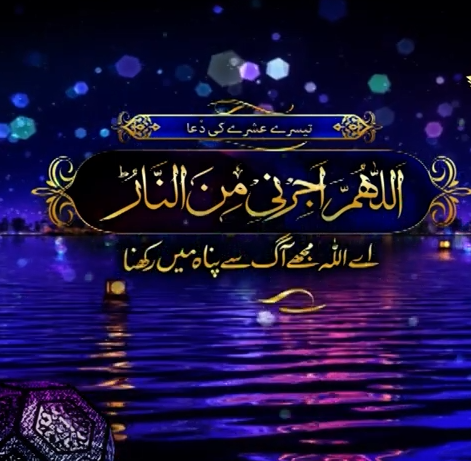3rd Ashra Dua with Urdu And English Translation | Benefits
Ramadan is the ninth month of the Islamic calendar, in which Muslims worship, fast during the day, pray at night, and strengthen their relationship with Allah. This month is a very blessed month. It is narrated from Hazrat Abu Hurairah that the Messenger of Allah (peace and blessings of Allah be upon him) said: When Ramadan comes, the gates of Paradise are opened, the gates of Hell are closed, and Satan is challenged (Al-Bukhari and Muslim). This month consists of 29 or 30 days and is divided into three parts, each consisting of three ten days. Muslims called them 1st Ashra ,2nd Ashra and 3rd Ashra.
Ist Ashra Dua
2nd Ashra Dua
What is the Third Ashra?
The last ten days of Ramadan are called the 3rd ashra, which are a means of salvation from the fire of hell. In these ten days, we should do as much good as possible and follow the commands of Allah Almighty. In these ten days, there is a night that is better than a thousand nights, it is called Laylatul Qadr.

This prayer reminds believers of the importance of the Hereafter and the consequences of their actions, and they directly ask Allah Almighty for salvation from the fire of Hell.
Significance of the 3rd Ashra:
The spiritual significance of the last ten days of Ramadan are following:
1.In the last ten days, there is a night called Laylatul Qadr, which is better than a thousand months.
2. The Prophet (peace and blessings of Allah be upon him) used to devote himself more to worship and supplication during these days.
3.During these last ten days, Muslims sit in I’tikaaf, which is a source of forgiveness and salvation.
Benefits of the 3rd Ashra and Its Dua
- Protection from Hellfire:
. The theme of this Ashra is seeking salvation from the fire of Hell.
. The Prophet (peace and blessings of Allah be upon him) said that Hell is real and one should seek permanent refuge from it.
. This is a reminder of one’s deeds and the key to salvation from Hell in prayer.
- Laylatul Qadr – The Night of power:
- One of the most extraordinary nights of peace is the Night of Power, which falls during these ten days.
- Allah, says in the Holy Quran: “Indeed, we sent down the Quran on the Night of Power, and what will make you know what the Night of Power is? It is better than a thousand months. (Surah Al-Qadr 97:1-3)
- Worshipping on this night is equivalent to worshipping for more than 83 years. The angels descend on this night, and Allah forgives the sins of those who sincerely repent and worship Allah.
3. Increased Worship and I’tikaf (Spiritual Retreat)
- The Holy Prophet (peace and blessings of Allah be upon him) used to observe I’tikaf during the last ten days of Ramadan and devote himself to complete worship.
- Muslims today follow this Sunnah and spend the last 10 days in the mosque prays and praying.
- I’tikaf helps believers detach from the world and strengthen their connection with Allah Almighty.
- Forgiveness and Erasing Sins;
Prophet Muhammad (peace be upon him) said: Whoever stands up on the Night of Power with faith and in the hope of reward, all his previous sins will be forgiven. (Bukhari, Muslim).
This is the greatest time to seek Allah’s forgiveness.
Reciting the dua:
اللَّهُمَّ إِنَّكَ عَفُوٌّ تُحِبُّ الْعَفْوَ فَاعْفُ عَنِّي
O Allah, you are the Forgiving and You love forgiveness, so forgive me.
- Special Acceptance of Dua;
Our beloved Prophet Muhammad (peace be upon him) said: There are three people whose supplications are not rejected: a fasting person until he breaks his fast, a just ruler, and an oppressed person. (Tirmidhi).
Practical Tips for Making the Most of the 3rd Ashra
- Focus more on Tahajjud, Tarawih and Nafl prayers with sincerity.
- Recite the Holy Quran and ponder over its details and engage deeply with the word of Allah.
- Worship on the odd nights of Laylatul Qadr, i.e. 21st, 23rd, 25th, 27th and 29th.
- Give charity every night. Indeed, even a small amount of charity can bring great blessings.
- Pray as much as possible for forgiveness, mercy, and salvation from the fire of hell. If possible, perform I’tikaaf.
Conclusion;
The third ten days of Ramadan are a time of immense blessings, forgiveness, and salvation. By reciting the dua of the third ten days, doing good deeds, and seeking Laylatul Qadr, we can hope for Allah to save us from the fire of Hell and grant us Paradise.






